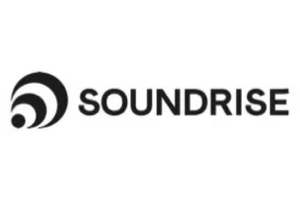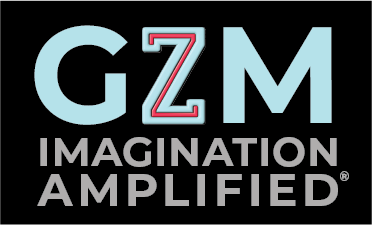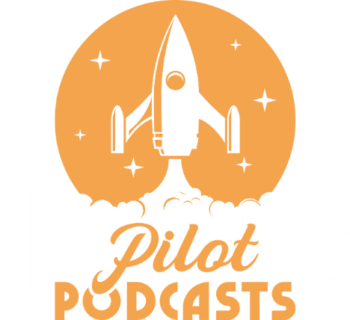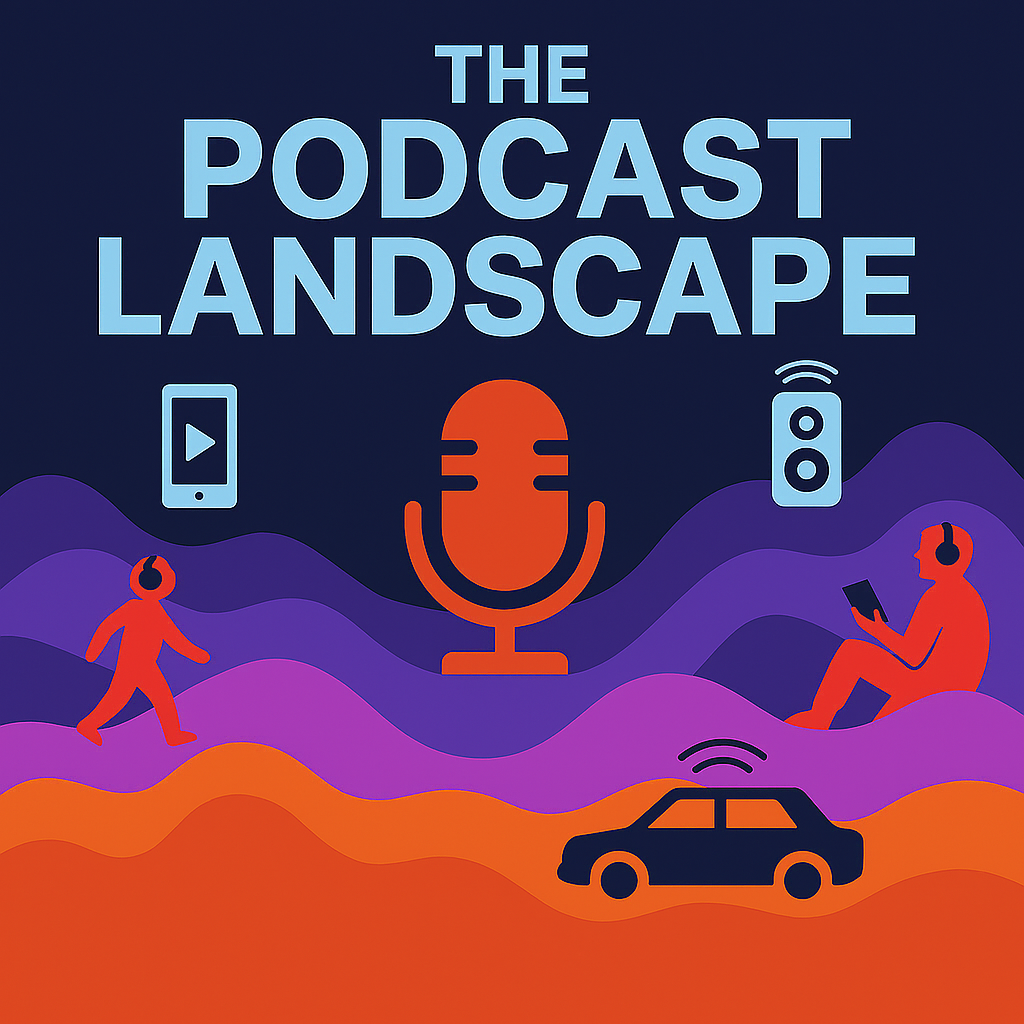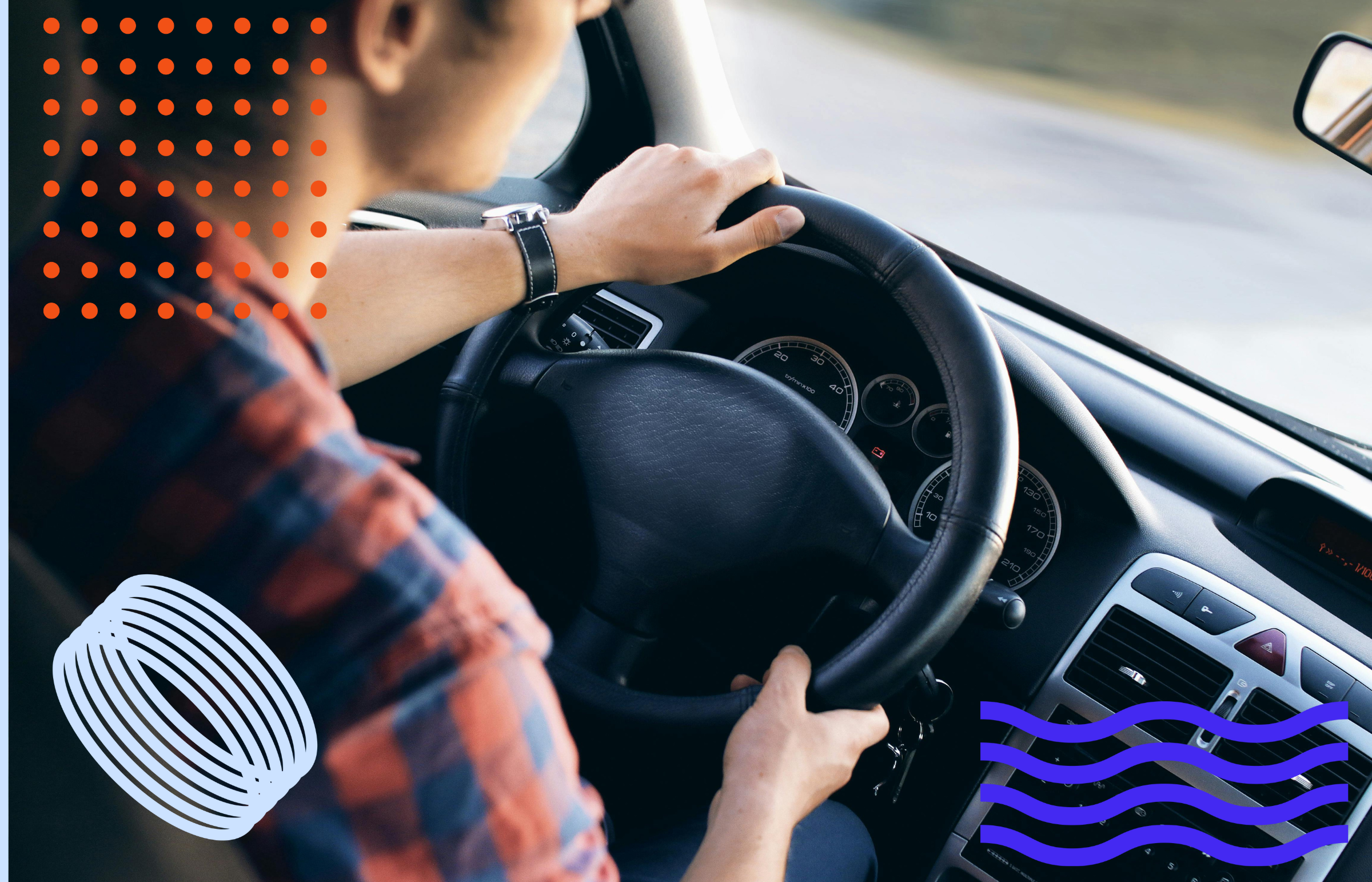This week on the Deepdive, Podscribe Director of Acquisition and Performance Marketing Amelia Coomber breaks down Podscribe’s attribution and reporting methodology. With a real-time dashboard, Podscribe allows advertisers to check campaigns easily from one centralized location. Tune in now!
On the last day of Podcast Movement, Tom, Manuela, and I hopped a plane to Austin to get ready for our first quarterly event not associated with a major podcast event. We chose SXSW because we knew one major audience would be there that our entire industry wants to get more time in front of: buyers. I’m incredibly happy to report that over a third of the attendees came from the buy-side, many of them net-new or lightly spending in podcasting today, and we were able to educate them on the values of advertising in podcasting through our latest research, The Medium Moves the Message: A Comparative Assessment of Advertising from Broadcast to Podcast, which you can watch live tomorrow, Wednesday March 22nd at 3pm EST.
We learned quite a bit from listening to these buyers speak in an environment friendly to them. There is a substantial difference between the conversations that happen when a seller pitches a buyer, and when multiple buyers feel they can speak freely and answer questions from multiple sellers openly, and not in response to a specific pitch.
A narrative emerged from this conversation that has been bubbling since I started in this industry, and one that I have dealt with nearly every day of my entire adtech career: podcasting’s “measurement problem”. Because the truth is, we’re not listening to what the buyers are saying.
Forest For the Trees
Ever since the IAB Australia Audio Summit earlier this month, the following slide from Natalie Stanbury’s presentation has been haunting my dreams:
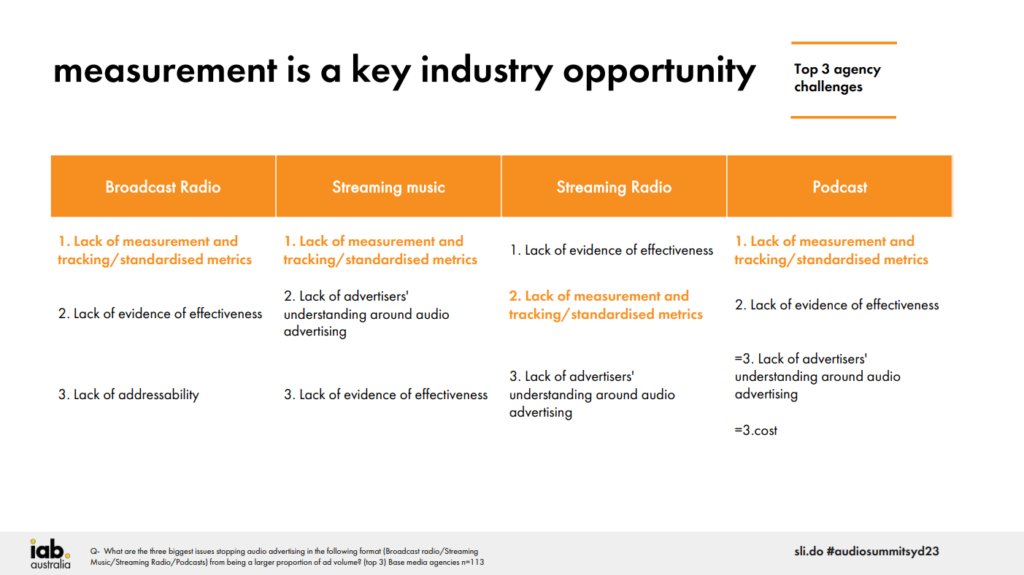
In the slide, you can see that Broadcast Radio, Streaming Music, and Podcast all list “Lack of measurement and tracking/standardized metrics” as the top answer when asked “What are the three biggest issues stopping audio advertising.” Streaming Radio lost their number one spot to “Lack of evidence of effectiveness” which to me, is a symptom of measurement. This perceived “measurement problem” certainly isn’t unique to podcasting, it really is all of audio.
Podcasting has focused too much on defending and explaining tracking/measurement, when our industry has built truly amazing technology to do more with what little we have. It’s easy to point at broadcast radio, broadcast television, direct mail, and out of home (digital or otherwise), as industries that are less effective with tracking and measurement than podcasting, and yet still attract more advertising dollars. But that’s low hanging fruit, so let’s aim higher.
Creators baking ads into their content on Youtube, Instagram, and TikTok are unable to apply an impression tracker to their campaigns. What they can do is place a link in the description, just like we can in podcasting, to drive their audience to a conversion. And judging by the estimate that the Social Media Influencer channel of advertising generated over $16bn (or more than 8x that of podcasting) in 2022, it’s not the technology holding us back, it’s the lack of rigidity in our standards.
Standardization Solves for Reach
We often hear that podcasting is fragmented, and that buying directly from hundreds of shows per campaign is not feasible. But that hasn’t swayed buyers away from buying directly with hundreds of creators on Youtube, Instagram, and TikTok. The key difference there is not that they get more data than podcasting (they don’t) or that they can use their third party solution of choice (they can’t): it’s that every creator they buy from on those platforms and/or from the platform directly all results in the same exact standardized measurement.
Exposure to more people on the buy side has made clear to me that when they speak about fragmentation, they mean it at our core. The download, our primary metric, is simply built on too loose of a specification. We see this with publishers migrating from one hosting platform to another who notice a discrepancy in their numbers. Or when comparing prefix and ad delivery measurement against a hosting platform’s analytics. And most importantly, when a buyer is trying to aggregate all the numbers needed not only to start a campaign, but to measure and chart the success of one.
To be clear, it’s not that the download is a bad metric at all, it’s just one envisioned almost ten years ago, for a much smaller industry than what we’re looking at today. The answer is not to continue to lament that podcasting is not a streaming technology, but instead to more specifically determine what a download is, and to make that measurement unquestionable across all of podcasting. There should be no “better way” to count a download, simply the strongest way we can unify around. It should be incredibly boring and painfully accurate when any entity in podcasting represents their numbers.
If the download was immutable, and everyone processed the raw requests the same way, we would create an environment that would allow for prefix and ad delivered third party measurement to be in lockstep with a hosting provider’s numbers. Third party measurement leads to third party billing, making it table stakes for all ad buyers to insist on tools that enable them to verify their results– something not available in Youtube, Instagram, and TikTok, but very common for them in other digital channels. Each company can then add on what makes them truly unique right after all our numbers perfectly align, which is the consistency that buyers are primarily asking for when they bring up podcasting’s measurement issues.
And we truly do have that opportunity today, as the IAB pursues a 3.0 update to the podcast guidelines that can absolutely have the teeth in it that we need today in podcasting to guarantee our future.
Wrapping It Up
As I reflect on all these points, I realize that my main reasons for being such a fan of programmatic advertising is structure. All of it is already established and it works across numerous industries. It absolutely won’t work for all aspects of podcasting, and today, programmatic partners are incredibly lenient with podcast suppliers on how everything is measured. But there is a time and place when that leniency ends and whatever numbers are reconciled in their platform are all that their buyers pay for, and thus become all that matters.
The panel at our SXSW event echoed that spending cuts and pauses have been advertising-wide, not unique to podcasting. They echoed a return to manageable tried and true solutions, such as their preferred channels and even attribution methodology like last-click which even Google moved away from as their default in 2021. With headcount and budgets lowered, comfort is the number one thing that matters to these buyers. But comfort and confidence can be easily confused. To the buyers, it’s not that podcasting doesn’t offer measurement or attribution, it is that our standards are not consistent and our methodologies don’t match their default solutions.
We’re a $2bn industry with momentum so impressive that we continue to draw eyes away from the rocketship that is Connected TV (CTV), while being a fraction of the size. If we wish to continue that momentum and close the gap on size, now, during this slowdown, is the time to rally around what we do have and make it better.
No one company can win this. The best they can do is splinter off into their own walled garden, and this doesn’t move the needle for podcasting.
I’d like to thank Glenn and Adam at Adopter, Stephen Smyk of Podfluencial, IAB Australia Director of Research Natalie Stanbury, AJ Feliciano of The Roost, and Matt Shapo of IAB for their contributions to this article through conversation that lead to the creation of this article.
New Partners
Sounds Profitable exists thanks to the continued support of our amazing partners. Monthly consulting, free tickets to our quarterly events, partner-only webinars, and access to our 500+ person slack channel are all benefits of partnering Sounds Profitable.
- Ten Percent Happier podcast: Learn the skill of happiness from experts in mindfulness & meditation. Hosted by Dan Harris.
- Gen-Z Media creates podcasts for families, friends and classrooms listening together and connecting over great stories vividly brought to life, such as SIX MINUTES.
Want to learn more about partnership? Hit reply or send us an email!























































